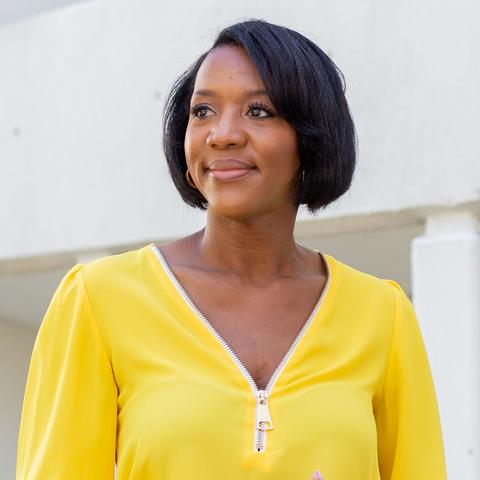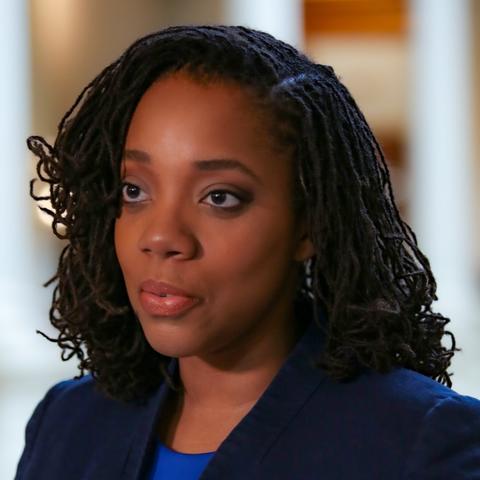Section Branding
Header Content
Dallas Austin 'laid out a roadmap' for Georgia music. Macon Film Festival honors him this weekend
Primary Content
While a film industry strike continues in California, the Hollywood of the South is getting ready to celebrate filmmaking in Middle Georgia.
The Macon Film Festival gets underway this week with nearly 100 films showing over the next few days. The highlight of the festival is the presentation of the very first Georgia Film Impact Award that will be presented to a native son of Columbus film and music producer, Dallas Austin.
Not only is Dallas a Grammy Award-winning music producer whose legacy now sits in the Songwriter Hall of Fame, but also he is a film producer who produced the movies 2002's Drumline and 2006's ATL. Drumline will be screened in Macon Saturday night at the festival along with a special performance by local high school marching bands.
GPB's Leah Fleming spoke with Austin ahead of the weekend.
TRANSCRIPT:
Leah Fleming: Hi, Dallas.
Dallas Austin: Hey, how's it going?
Leah Fleming: Hey, we are good. We're very good. And it's great to spend some time with you to talk about this moment. Now, I know you have received a lot of awards, but tell me how this one feels. Does it kind of feel like a full circle moment to receive it from, you know, Georgia?
Dallas Austin: This moment feels amazing because, you know, it took me 10 years to make Drumline. And every single day I was just kind of chopping down the blocks to, you know, running back and forth between Hollywood and Atlanta and wanting to make sure that the story was told in the right way, you know. So it was it wasn't an easy task, but it was worth it, at the end of the day. And to me, to be honored in Georgia for it with the Impact Award is everything. Plus, I ended up passing the Georgia film bill because of ATL trying to get that movie shot in Georgia and not having to go shoot it in New Orleans. And so I took the film bill and kind of implemented it with Sonny Perdue to say, hey, this is what we need to do, because if not this is what's happening. And so all of this really kicked off the film industry. So to me, I'm really proud about getting the award because this is — it's encompassing all of those things to me, you know, that I don't think that people in Georgia really knew about.
Leah Fleming: Now, I read that this movie, Drumline, was based on your story, based on your story in Columbus, based on your relationship with your, you know, your girlfriend/prom date, who many of us remember dearly, Kim Porter, who passed away. Who herself in her own right, was a phenomenal actress and model, beautiful model. So tell me about that, about your story. How close is it to the true story?
Dallas Austin: I mean, any kind of change we took it from high school to college, so college would make it a bigger draw or whatever, but it's the same high school story. Kim played — we were the marching band together at Columbus High and we were both on the drumline. And she played she played bells, I played snare drum, and they were always just kind of trying to keep us apart. And we were always trying to be together, you know, as a little squad. And so the whole, like, the whole story is a Columbus High School story. You know, even when we took the bands, the drumline down to the field, that was because ... the band director at the time, wouldn't let us play what we wanted to play against Carver High School. So — and Carver High School was killing us, you know, because they were a predominately Black school. And so I said, well, look, we'll just play what you want us to play on the fields, but can we have a part day where we battle the drumline? And just, just the drumlines, just us against Carver. And he said, okay, fine. So we did that, and when we did that part day we battled them; that's the time we had the fire extinguishers on the drum and a fight broke out.. So, you know, it's got a lot of these things that happened in Columbus, but we put them in the in the Drumline as a college story instead of a high school story.
Leah Fleming: Oh, okay. Do you still play the snare drum?
Dallas Austin: I still play; it's probably nowhere near as good as I used to be, but I still play.
Leah Fleming: You can still do it?
Dallas Austin: The machines got me spoiled now.
Leah Fleming: So as you were saying, you are from Columbus. You eventually moved to Atlanta and — to get into music, the business of it. And there was this moment that you forced change as a kid. That story about you at the bus stop and your mother. Tell us about that.
Dallas Austin: Yeah, I was in Columbus me I asked my mom — you know, every Christmas I get a little keyboard and could I get a bigger one? And you couldn't be in a real band unless you had a real keyboard, you know? So my brother financed one for me 1,200 bucks for five years, and that was my saving grace. And then one day he came in the room, and he picked the keyboard up and threw it and broke it because I was ignoring him about cleaning up the room. So I left went to the Greyhound bus station and was like, OK, that's it. I'm out of here. This dude broke my keyboard. I can't be a big star. And so Mom comes around and she said, "look. I know you're stubborn; you're 13 years old. Where are you going?" I'm going to Atlanta, stay with my Aunt Clara, I'm gonna be a big producer. And she says, "well, tell you what, give it til tomorrow. No buses are going today. I know you're mad, come back home." And I went back home with her. And she said if you still feel that way tomorrow we'll sort it out. So I got up the next day, looked at my keyboard again with the broken keys, and I was like, that's it. And I went downstairs to her restaurant, took a little money out of the cash register, then went back to the bus station, and then she comes around. "What are you doing?" Because it was walking distance from her restaurant. "What are you doing?" I said, "I'm going to Atlanta; I can't be a big producer down here." And she's like, "you're that serious?" I'm like, "I'm gone. I'm out of here." And so she goes, "All right, well, if you're doing that, you're not leaving me. So give me some time to sell the restaurant. Give me six months to sell the restaurant. We'll move to Atlanta, and I'll go with you," and that's how we got up here. From that point, you know, I got to be known as this 14-year-old keyboard-playing kid that, you know, really could play well. And they started getting me to do studio sessions and things like that before I even turned 16. They would come pick me up because I couldn't drive yet. So I'd come back home and give the checks to my mom and say "Hey look, I'm making some money!" And then so from that point, with the backing of her, I knew I could do anything from that point because, you know, she was the — she was my backpack at that point. And, you know, starting with Joyce Irby, Doug E. Fresh when was like 16 or 17, I got my first No. 2 two record out. And then from that point, I went into Another Bad Creation and Boys II Men and TLC. And then from that point, everything just started to roll.
Leah Fleming: What do you want your legacy to be at this moment? .
Dallas Austin: You know, I just want to want to be able to say I laid out the roadmap for everybody else to do it. That I contributed — contributed a significant amount to our music community and our entertainment community. And, you know, one thing about Atlanta is that we still remain community. We still remain friends, me and Jermaine and me and Jazze Pha, you know, whoever — Tricky Stewart — all of us are still boys. We still, like, country as I don't know what. We still, if it's somebody's birthday, we go to their house. You know, it's like we didn't lose that. And and in New York and L.A., you lose that. You lose that as a community because of people blowing your head up and think you thinking you're the best and the biggest. And then, you know, and then, you know, you have no other community to bounce back off of when you start acting that way. So we've always just supported each other. And that's what my legacy to be, that I've had a significant impact on changing our culture, changing our economy here, you know, and I letting them know it could be done.
Leah Fleming: We have been speaking with Dallas Austin. Thank you so much, Dallas, for spending some time with us.
Dallas Austin: Thank you. I appreciate it so much.
Leah Fleming: This is GPB.
This transcript has been edited for length and clarity.



